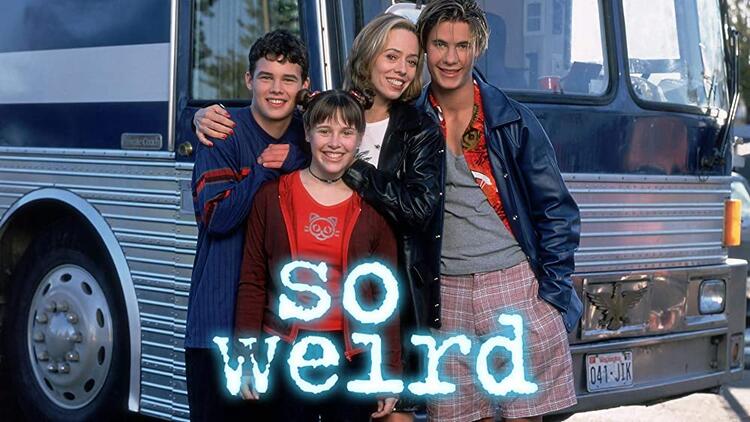As a kid, my favorite show was about death. Well, not just death: it was also about faith, sacrifice and trying to make sense of life’s ineffable mysteries. Strangest of all, I watched it on the Disney Channel.
“So Weird” ran for three seasons from 1999 to 2001. It was Disney’s attempt to create a kid-friendly version of “The X-Files,” tapping into an in-vogue fascination with ghosts, alien encounters and other paranormal phenomena. In practice, it became something more: a meditation on mystery and mortality.
It was an enormously important piece of art for me as a young person, reflecting my own fears and fascinations with the strange, complicated world of adulthood. As I’ve grown up it has only become more resonant, and my appreciation for its artful handling of grief, faith and life’s big questions has only deepened. “So Weird” is a rare TV show that can speak to you at both 14 and 34.
Disney always seemed a little wary of “So Weird,” and it never received a home media release. Consequently it has been largely forgotten, aside from the occasional nostalgia essay. Now that the entire series is available to stream on Disney+, the time is right for a new audience (of all ages) to discover it.
Now that ‘So Weird’ is available to stream on Disney+, the time is right for a new audience (of all ages) to discover it.
“So Weird” follows Fiona “Fi” Phillips (Cara DeLizia), who travels the country with her rockstar mom, Molly (Mackenzie Phillips), and older brother, Jack (Patrick Levis), while investigating paranormal mysteries. Each episode features another stop on the tour route and a new weird phenomenon: a haunted theater, a town plagued by crop circles, a space-time singularity in someone’s backyard. At the heart of Fi’s quest is her grief over losing her father, Rick (Chris Gibson), at a young age. Her fascination with the paranormal isn’t just a hobby; it’s motivated by the desire to somehow reunite with him.
The series uses paranormal phenomena to ask the big questions. In the episode “James Garr,” a weird sci-fi premise (Fi meets a man who was cryogenically frozen for twenty years) becomes a meditation on the existence of the soul and what makes us human. In the goofy-but-prescient episode, “Simplicity,” an encounter with gremlins reveals anxieties about the rapid growth of information technology and the excesses of eccentric tech billionaires.
Again and again it returns to themes of sacrifice and community. Fi quickly learned that serving the greater good meant that you have to be willing to give of yourself, and her adventures demanded increasingly greater sacrifices. Most wrenching is the episode “Strange Geometry,” where she gives up a chance to resurrect her father in order to free thousands of souls trapped between life and death. As dark and strange as things get, Fi always finds she can get through difficulty by relying on her family and friends. Life’s mysteries, she discovers, are best faced in a community. Jon Cooksey, one of the original showrunners, summarized the message of the series as “Life is difficult. Stick together.”
It was also the first show I watched that engaged with faith. While not a religious show, Fi’s belief that there was a transcendent dimension to life, and specifically that there is life after death, is the heart and soul of the series. In some ways, it is a faith born of desperation: if there is no afterlife, then her father really is gone forever. Even when she finds evidence of the Spirit World, it isn’t always comforting; it often seems to be full of unknowable beings who mean us harm. Despite her encounters with evil, Fi keeps faith that good is out there, too, and that she will see her father again.
I related to Fi. She was my age, she also often felt lonely or misunderstood, and we were both fascinated with our Irish heritage (and while she wasn’t Philly Irish-Catholic, her grandparents were—close enough). More importantly, we wrestled with the same questions. In my early teens, death became real for me. My grandfather passed away, the first close family member I had lost. He lived in California, so there was no real chance to say goodbye; I simply knew, one day, that I would never see him again. My sophomore year of high school began with the Sept. 11th terrorist attacks, and I watched as our country tightened itself into an armored fist, preparing for eternal war. Death was no longer abstract, which only made it more mysterious and frightening.
More than that, I struggled to understand where my faith fit in my life. My childhood Catholicism, shaped by colorful religion workbooks and Sunday Mass at my comfortable suburban parish, suddenly seemed inadequate compared to the harsh, solid reality of death. God had not stopped the terrorist attacks, and would not stop the coming war. I wondered if holding onto my faith made sense, or if it was just one more piece of childhood that I had to outgrow.
“So Weird” turned out to be a surprising, but solid, companion in this moment of spiritual upheaval. I didn’t share Fi’s belief in hauntings, psychic phenomena or UFOs (the church has a famously dim outlook on the occult, although we’re generally fine with the idea of aliens), but there was something comforting about her certainty that there was a hidden reality beyond the world we can see. Not only was that faith confirmed in every episode, it was one of Fi’s greatest strengths. It carried her through the dark times. It inspired her to help people, to try to do something good in this life, regardless of what happens in the next. Faith wasn’t always easy, but it was worthwhile.
In ‘So Weird,’ faith wasn’t always easy, but it was worthwhile.
The series took on a lighter tone in the third and final season, per the network’s wishes. Fi was replaced with a sunnier protagonist (Annie, played by Canadian singer-songwriter Alexz Johnson) and the series’ original arc, which concluded with Fi descending into Hell to stand against a terrible, ravenous evil, was abandoned. Gone was all of that wrestling with grief and mystery, replaced with more standard Disney messages about self-actualization. It didn’t last another season.
Presumably, Disney felt this change would make the show more appealing to a young audience. But the thematic gravity of those first two seasons was exactly why I loved the show, and why it still means so much to me now. I have left the terror and discovery of adolescence behind, but life continues to be weird. If anything, questions about death and what happens after only become more potent as I get older. When I rewatch it now, as a parent, I find myself relating more to Molly: her desire to help her kids navigate life’s mysteries, while still grappling with them herself.
Today, “So Weird” deserves a new audience. There is plenty to recommend it beyond its engaging themes: a fun and dynamic cast, consistently strong writing, deeply nostalgic ’90s fashion and technology, and some creepy practical effects that hold up surprisingly well (as well as some C.G.I. that doesn’t, though it retains a goofy charm). It is a story we all need, especially now. A story that reminds us that to be a good person, we must be willing to make sacrifices. That keeping the faith is worthwhile, even in the darkest of times. And that while life can be mysterious and frightening, the best way to face it is together.
[“So Weird is streaming now on Disney+]
More from America:








